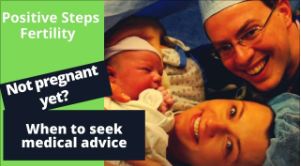Struggling to conceive can feel isolating, especially when you’re ovulating regularly. At Positive Steps Fertility, we understand the heartache and confusion of wondering why pregnancy isn’t happening. You’re not alone, and there are answers.
Let’s explore the reasons behind this challenge and how you can take the next step toward building your family.
Why Ovulation Doesn’t Always Mean Pregnancy
Ovulation is a key step in conceiving, but ovulating is not a guarantee of pregnancy. By ovulating, your body might be releasing eggs, yet other factors can stand in the way. According to the American Society for Reproductive Medicine (ASRM), about 1 in 9 couples face fertility challenges, even with regular ovulation.
If you’re tracking your cycle, seeing signs of ovulation, and timing intercourse just right, it’s easy to assume everything should be working. And yet—no positive test. This disconnect can feel confusing and disheartening. The truth is, while ovulation is essential for conception, it’s not the whole story.
Ovulating means an egg is released from the ovary, typically once a month. But that egg still has to meet healthy sperm at just the right time. Then, it needs to travel through the fallopian tube, be fertilized, and implant in a receptive uterus. That’s a lot of steps—and any one of them not going smoothly can prevent pregnancy, even when you’re ovulating consistently.
According to the American Society for Reproductive Medicine (ASRM), a healthy couple has about a 15–25% chance of conceiving each month. That number can drop significantly if there are hidden issues, like poor egg or sperm quality, blocked fallopian tubes, or a uterine lining that isn’t ready to support implantation.
In other words, ovulation sets the stage, but a successful pregnancy depends on a full cast of supporting factors. If even one piece is out of sync, conception may not occur. That doesn’t mean something’s “wrong” with you – it means there’s more to uncover, and that’s where fertility testing can make all the difference.
Common Reasons You Might Not Be Getting Pregnant Despite Ovulating
If you’re ovulating but not pregnant, several factors could be at play. Here are a few possibilities, explained simply:
- Hormonal Imbalances: Even with ovulation, hormones like progesterone need to be balanced to support implantation. Low levels can make it harder for an embryo to thrive, per the Journal of Reproductive Endocrinology.
- Blocked Fallopian Tubes: If the tubes are blocked, the egg can’t meet the sperm. This affects about 20-30% of women with infertility, according to ASRM.
- Uterine Conditions: Fibroids or polyps in the uterus can interfere with implantation, even if an egg is fertilized.
- Lifestyle Factors: Stress, smoking, or weight fluctuations can subtly impact fertility, as noted in Fertility and Sterility.
- Unexplained Infertility: Sometimes, no clear cause is found, which can be frustrating but doesn’t mean there’s no hope.
Not sure what’s affecting you? A fertility specialist can help pinpoint the cause with targeted tests.
Could It Be Your Cycle? Understanding Ovulation Challenges
You might track ovulation with apps or kits, but cycles can still have hidden issues. For example, according to Human Reproduction Journal. A short luteal phase (the time between ovulation and your period) can make it harder for an embryo to implant. Irregular cycles or poor egg quality, especially as women age, can also play a role.
Tracking ovulation is an empowering first step — many women use apps, basal body temperature, or ovulation predictor kits (OPKs) to pinpoint their fertile window. But even when it seems like everything is lining up, hidden issues in your cycle can quietly interfere with conception.
One often-overlooked issue is luteal phase defect, when the second half of your cycle (after ovulation) is too short to allow a fertilized egg to properly implant. Normally, the luteal phase lasts about 12–14 days. If it’s consistently under 10 days, the uterine lining may not have enough time to mature and support early pregnancy. Research published in the Human Reproduction Journal suggests that even subtle luteal irregularities can impact fertility outcomes.
Other cycle-related concerns include irregular ovulation, where you may skip ovulation some months or ovulate at unpredictable times. Conditions like Polycystic Ovary Syndrome (PCOS), thyroid disorders, or elevated prolactin levels can disrupt the regularity of ovulation even if you still get a monthly period. Sometimes, what looks like a “normal” cycle on the surface is masking a deeper imbalance.
Egg quality also plays a role. As women age, egg quality naturally declines, particularly after age 35. Poor egg quality can reduce the chance of successful fertilization or healthy embryo development, even when ovulation is happening.
If your periods are inconsistent, unusually light or heavy, or accompanied by significant pain or mood shifts, those could be signs that something in your cycle is off. You may also notice changes in cervical mucus or basal body temperature that suggest ovulation isn’t occurring as expected.
Keeping a journal that tracks your cycle, symptoms, and ovulation signs can be a helpful diagnostic tool. Bring this information to your fertility consultation — it helps us get a clearer picture of how your body is functioning month to month.
What Role Does Your Partner’s Health Play?
Fertility is often seen as a woman’s challenge—but that’s only half the story. In fact, male factor infertility is involved in about 40% of cases where couples are having trouble conceiving, according to the American College of Obstetricians and Gynecologists (ACOG). That’s why it’s so important to view this as a shared journey.
Even if your partner appears healthy, sperm health can be impacted by a wide range of factors. Low sperm count, poor motility (how well sperm move), or abnormal shape (morphology) can affect whether sperm can reach and fertilize the egg. Often, there are no obvious symptoms, and issues are only discovered after testing.
Fortunately, assessing male fertility is straightforward. A semen analysis is a simple and noninvasive test that measures sperm count, movement, and form. If issues are found, many are treatable through lifestyle changes, medications, or specialized fertility treatments like intrauterine insemination (IUI) or in vitro fertilization (IVF).
Are Lifestyle Factors Affecting Your Fertility?
Research shows that women at weight extremes—either underweight or overweight—are significantly more likely to experience fertility challenges. According to the American Society for Reproductive Medicine (ASRM), being overweight can lead to insulin resistance, which may disrupt ovulation. One study found that even a modest 5% reduction in body weight can restore ovulation in some women.
Men aren’t off the hook either. Obesity can lower testosterone levels and reduce both sperm count and motility. Fertility is a shared journey, and both partners benefit from positive lifestyle choices.
Here are a few evidence-based adjustments that may improve reproductive health:
Nutrition matters:
A well-balanced, anti-inflammatory diet rich in whole grains, leafy greens, lean proteins, and healthy fats supports hormone production and egg quality. A Harvard study found that women who followed a fertility-focused diet saw up to an 80% reduced risk of ovulatory disorders.
Exercise in moderation:
Consistent, moderate physical activity supports metabolic health and hormone regulation. Extreme endurance training, on the other hand, can suppress ovulation, so balance is key.
Limit caffeine, alcohol, and avoid smoking:
High levels of caffeine and alcohol may impair fertility, and smoking is known to accelerate egg loss and damage sperm DNA.
Manage stress:
Chronic stress may throw off hormonal rhythms and disrupt ovulation. Techniques like yoga, meditation, journaling, or even just slowing down your schedule can have a real impact.
Get quality sleep:
Your body’s reproductive system thrives on rest. Disrupted or insufficient sleep can impact the release of fertility-regulating hormones like melatonin and leptin.
No one gets every detail right, and perfection isn’t the goal. But thoughtful changes in your routine can gently tip the odds in your favor. If you’re unsure which habits might be affecting your fertility or how to start making changes, we’re here to guide you, without judgment, just support.
When Should You Seek Fertility Testing?
Wondering when to see a specialist? ASRM recommends seeking help if you’re under 35 and have been trying for a year, or after six months if you’re 35 or older. If you have irregular cycles, a history of miscarriage, or known conditions like PCOS, don’t wait—reach out sooner. Testing isn’t as scary as it sounds, and it’s the first step to clarity. At Positive Steps Fertility, we start with a conversation to understand your unique story.
What to Expect from a Fertility Assessment
A fertility assessment doesn’t have to be overwhelming. At Positive Steps Fertility, we use the Parryscope® Diagnostic, a gentle, 20-minute procedure developed by Dr. John Preston Parry to provide comprehensive answers with less stress. Unlike traditional methods requiring multiple tests, the Parryscope® evaluates three key areas in one visit:
- Ovarian Reserve: Assesses the number and quality of your remaining eggs to understand your fertility potential.
- Fallopian Tube Patency: Checks if your tubes are open, ensuring the egg and sperm can meet.
- Uterine Readiness: Confirms your uterus is prepared to support a pregnancy.
This innovative approach replaces separate HSG or imaging studies, offering faster, clearer results with minimal discomfort. “Dr. Parry explained every step so I felt at ease,” said patient Emily.
Learn more about the Parryscope® at positivestepsfertility.com/fertility-testing/parryscope-testing. We’re here to make the fertility process clear and comforting, tailored to you.
Frequently Asked Questions About Ovulation and Infertility
We know you have questions. Here are answers to some common ones.
Can stress stop me from getting pregnant?
Stress alone rarely causes infertility, but it can disrupt hormones or ovulation. Relaxation techniques like deep breathing or a warm bath may help, but don’t blame yourself—biology is complex.
What tests diagnose why I’m not pregnant?
The Parryscope® Diagnostic is a gentle, all-in-one test that checks your ovaries, tubes, and uterus. Additional blood tests or ultrasounds may be tailored to your history.
How does age affect fertility?
Fertility declines gradually after 30 and more sharply after 35, per NEJM. But many women conceive later with personalized support.
What are the first steps if I’m not conceiving?
Track your cycles, optimize your health, and consider a consultation after 6-12 months of trying.
Can I be infertile and still ovulate?
Yes. Ovulation is only one part of the process. Issues with tubes, uterus, hormones, or your partner’s fertility can still affect conception.
What are the signs of poor egg quality?
Irregular cycles, a short luteal phase, or low ovarian reserve markers (like AMH) can suggest egg quality concerns, especially after age 35. The Parryscope® can provide clarity.
What if ovulation tests are always negative?
You might be missing a short LH surge, or you may not be ovulating despite regular periods. The Parryscope® can confirm whether ovulation is occurring.
Could my fallopian tubes be blocked?
There are usually no symptoms, but a history of PID, ectopic pregnancy, or endometriosis increases risk. The Parryscope® checks tube patency in one gentle test.
Have more questions? Our team is ready to help.
Stories of Hope: Real Experiences from Women Like You
“I want to give this place 20 stars if I can! This place is amazing! I have been struggling with infertility for many years, and we went to different places, and this is the only place that cares about the patient, and they understand how difficult it is to have infertility! All the nurses I met are very nice and kind, they are trying their best to make you feel comfortable and explain everything to me. Dr parry is very smart. He did a thorough assessment for me, he told us everything in detail and explained our options. The Parryscope test was very simple and quick. I highly recommend this place. Thank you for taking care of us.” – Sarah, 34
Stories like Sarah’s remind us that every journey is unique. These experiences show that answers are possible, even when the road feels long.
How Positive Steps Fertility Supports Your Journey
At Positive Steps Fertility, we believe every woman deserves answers and a plan that feels right for her. Our team of compassionate specialists listens to your concerns and creates a personalized approach. Whether it’s diagnostic testing, lifestyle guidance, or advanced treatments, we’re by your side. As one patient shared, “They made me feel heard and gave me hope when I needed it most.” Our goal is to empower you with knowledge and options, so you can move forward with confidence.
What’s Next? Taking the First Step Toward Answers
If you’re ovulating but not pregnant, you don’t have to navigate this alone. Understanding why is the first step toward your dream of parenthood. At Positive Steps Fertility, we’re here to provide clarity and support. Explore your options by connecting with our team for a conversation—no pressure, just answers. You’ve got this, and we’ve got your back.




